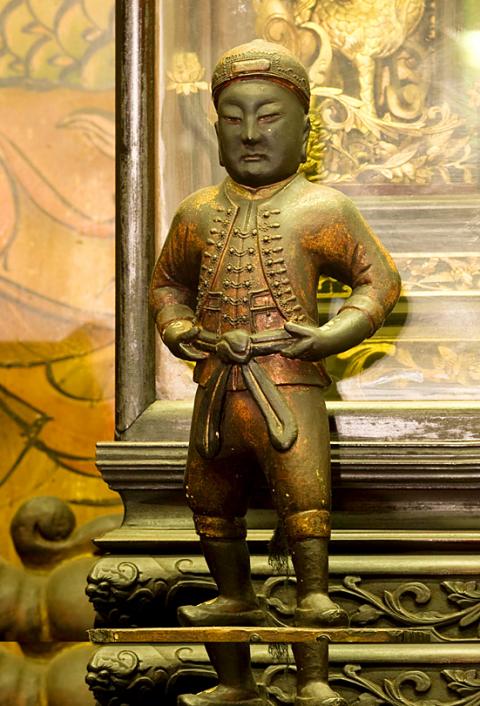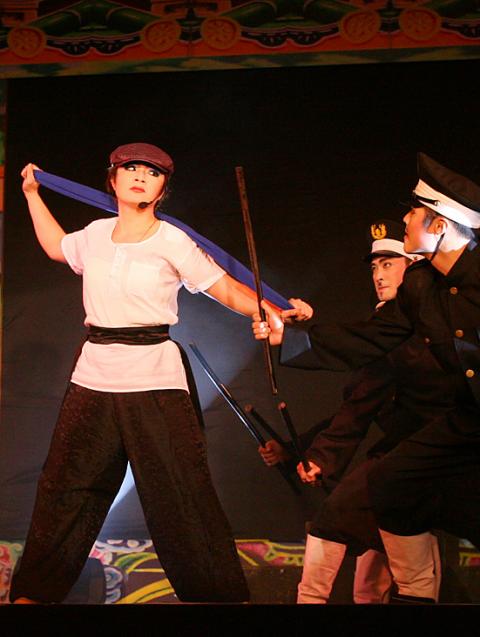At a time when the gap between rich and poor is growing, housing is increasingly out of reach for the middle class, and the government seems to favor large corporations, it’s no surprise that the story of “Taiwan’s Robin Hood” (台灣羅賓漢) still resonates.
Xia Hai City God Temple (霞海城隍廟), located in Dadaocheng’s (大稻埕) historical Dihua Street (迪化街), will hold events on Monday to pay homage to Liao Tien-ding (廖添丁), a celebrated outlaw active in Taiwan over a century ago who was the bane of Japanese authorities and wealthy families that benefited from the colonial government’s largesse.
A prayer ritual will also be held at 10am on Sunday at Hanmin Temple (漢民祠) in Bali District (八里), New Taipei City. The temple was built in Liao’s honor.

Photo courtesy of Xia Hai City God Temple
Xia Hai temple spokesperson Titan Wu (吳孟寰) said Liao’s exploits, which include killing a police informer in Keelung (基隆), robbing tea merchants in Shilin (士林) and stealing guns and ammo from a police station in Dadaocheng, have led many to dub him “Taiwan’s Robin Hood” because he stood up to the colonial rulers and divided his booty among the poor.
Wu said that one legend relates how Liao stole money from a wealthy merchant in Dadaocheng and placed the loot under a table inside Xia Hai City God Temple.
“He then told temple officials to distribute the money to the poor people squatting outside the temple,” Wu said.

Photo courtesy of Xia Hai City God Temple
He added that many in contemporary society could learn something from Liao’s public-spiritedness.
“Today’s social order is extremely chaotic, and people have little sense of morality. [Liao] can serve as an example for people to follow,” Wu said.
Monday’s events kick off at 10am with a prayer ceremony to Liao at Xia Hai. At 12pm, the temple will distribute red turtle cakes (紅龜粿), a pastry made from glutinous rice and sugar that many believe can ward off evil and bring prosperity, Wu said.
Celebrations end with an opera by Yihsin Opera Troupe (一心歌仔戲劇團) relating the life and times of Liao. The free performance, located next to the temple at Yongle Square (永樂廣場), begins at 7pm.
Born in 1885 to a peasant family in what is now Greater Taichung, Liao is said to have mastered martial arts at a young age before embarking on his adventures throughout northern Taiwan. Police eventually caught up with him at his hideout on Bali’s Guanyin Mountain (觀音山) in November 1909, where he was gunned down in a shootout.

In the March 9 edition of the Taipei Times a piece by Ninon Godefroy ran with the headine “The quiet, gentle rhythm of Taiwan.” It started with the line “Taiwan is a small, humble place. There is no Eiffel Tower, no pyramids — no singular attraction that draws the world’s attention.” I laughed out loud at that. This was out of no disrespect for the author or the piece, which made some interesting analogies and good points about how both Din Tai Fung’s and Taiwan Semiconductor Manufacturing Co’s (TSMC, 台積電) meticulous attention to detail and quality are not quite up to

April 21 to April 27 Hsieh Er’s (謝娥) political fortunes were rising fast after she got out of jail and joined the Chinese Nationalist Party (KMT) in December 1945. Not only did she hold key positions in various committees, she was elected the only woman on the Taipei City Council and headed to Nanjing in 1946 as the sole Taiwanese female representative to the National Constituent Assembly. With the support of first lady Soong May-ling (宋美齡), she started the Taipei Women’s Association and Taiwan Provincial Women’s Association, where she

Chinese Nationalist Party (KMT) Chairman Eric Chu (朱立倫) hatched a bold plan to charge forward and seize the initiative when he held a protest in front of the Taipei City Prosecutors’ Office. Though risky, because illegal, its success would help tackle at least six problems facing both himself and the KMT. What he did not see coming was Taipei Mayor Chiang Wan-an (將萬安) tripping him up out of the gate. In spite of Chu being the most consequential and successful KMT chairman since the early 2010s — arguably saving the party from financial ruin and restoring its electoral viability —

It is one of the more remarkable facts of Taiwan history that it was never occupied or claimed by any of the numerous kingdoms of southern China — Han or otherwise — that lay just across the water from it. None of their brilliant ministers ever discovered that Taiwan was a “core interest” of the state whose annexation was “inevitable.” As Paul Kua notes in an excellent monograph laying out how the Portuguese gave Taiwan the name “Formosa,” the first Europeans to express an interest in occupying Taiwan were the Spanish. Tonio Andrade in his seminal work, How Taiwan Became Chinese,